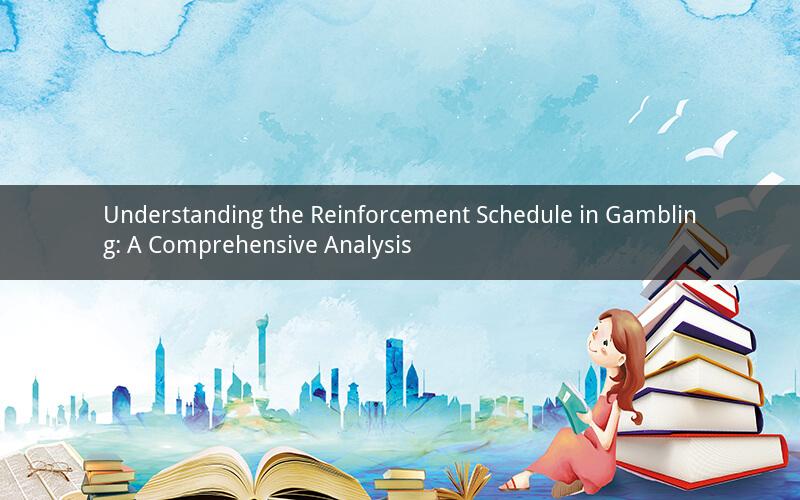
Gambling has been a part of human culture for centuries, captivating individuals with its thrilling nature and potential for financial gain. One key element that drives the addictive behavior in gambling is the reinforcement schedule. This article aims to delve into the concept of reinforcement schedules in gambling, highlighting the various types and their impact on gamblers.
1. What is a reinforcement schedule?
A reinforcement schedule refers to the timing and frequency of reinforcement or reward that follows a behavior. In the context of gambling, it is the pattern in which rewards are delivered to gamblers, which plays a crucial role in shaping their behavior. The reinforcement schedule can significantly influence a person's decision-making, risk-taking, and likelihood of developing gambling problems.
2. Types of reinforcement schedules in gambling
a. Fixed ratio (FR) schedule: In this schedule, a fixed number of responses is required before a reward is delivered. For example, in a slot machine, a gambler might need to play 100 times before the machine pays out. The FR schedule is highly effective in promoting consistent behavior, as gamblers tend to play more to earn rewards.
b. Variable ratio (VR) schedule: Unlike the FR schedule, the VR schedule does not require a fixed number of responses. Instead, rewards are delivered after a variable number of responses. This schedule is particularly powerful in maintaining a high level of engagement and persistence. Poker and blackjack are examples of games that utilize the VR schedule.
c. Fixed interval (FI) schedule: In this schedule, a fixed amount of time must elapse before a reward is delivered. For instance, a gambler might receive a bonus after every hour of play. The FI schedule encourages a steady flow of behavior, as gamblers are motivated to continue playing to earn rewards.
d. Variable interval (VI) schedule: The VI schedule is similar to the FI schedule, but the interval between rewards is variable. This schedule creates a sense of unpredictability and keeps gamblers engaged, as they never know when the next reward will come. Slot machines often use the VI schedule.
3. Impact of reinforcement schedules on gambling behavior
The reinforcement schedule significantly affects gamblers' behavior in several ways:
a. Increased engagement: The use of reinforcement schedules, particularly VR and VI schedules, encourages gamblers to engage in more gambling activities, leading to increased exposure and potential for developing gambling problems.
b. Risk-taking: Gamblers who experience variable rewards are more likely to take risks in an attempt to increase their chances of winning. This behavior can lead to significant financial and emotional consequences.
c. Reward dependence: As gamblers become accustomed to the reinforcement schedule, they may develop a dependence on rewards, making it difficult for them to quit gambling even when faced with negative consequences.
4. The role of reinforcement schedules in problem gambling
Research has shown that individuals with problem gambling tend to be more sensitive to reinforcement schedules. They may seek out games with variable rewards, leading to a higher likelihood of developing gambling-related issues. Additionally, the unpredictable nature of the VI schedule may contribute to the development of anxiety and stress, exacerbating the gambling problem.
5. Strategies for addressing reinforcement schedules in gambling
To mitigate the negative effects of reinforcement schedules in gambling, several strategies can be employed:
a. Limiting exposure: Governments and organizations can implement measures to limit the number of gambling opportunities available to individuals, such as setting a maximum number of slot machines or banning certain types of gambling altogether.
b. Education: Raising awareness about the impact of reinforcement schedules on gambling behavior can help individuals make informed decisions and avoid problem gambling.
c. Treatment: For those already struggling with gambling problems, therapy and support groups can be effective in addressing the underlying issues related to reinforcement schedules.
In conclusion, reinforcement schedules play a vital role in the addictive nature of gambling. Understanding the different types and their impact on gamblers is crucial in addressing and preventing problem gambling. By implementing strategies to mitigate the negative effects of reinforcement schedules, we can create a safer and healthier environment for individuals engaged in gambling activities.
Questions and Answers:
1. Q: How does the VR schedule contribute to problem gambling?
A: The VR schedule is designed to maintain a high level of engagement and persistence, which can lead individuals to play more and take greater risks in an attempt to achieve rewards. This can result in the development of problem gambling.
2. Q: Why are slot machines considered to be particularly effective at promoting gambling addiction?
A: Slot machines often use the VR and VI schedules, which are highly effective in maintaining a high level of engagement and persistence. The unpredictable nature of the rewards makes gamblers more likely to continue playing, increasing the risk of addiction.
3. Q: Can reinforcement schedules be modified to reduce problem gambling?
A: Yes, modifying reinforcement schedules can be an effective strategy in reducing problem gambling. For example, implementing fixed rewards or increasing the intervals between rewards can encourage healthier gambling behaviors.
4. Q: How can governments and organizations address reinforcement schedules in gambling?
A: Governments and organizations can implement measures such as limiting the number of gambling opportunities, raising awareness about the impact of reinforcement schedules, and providing treatment and support for individuals struggling with gambling addiction.
5. Q: Is there a direct correlation between the VR schedule and the likelihood of developing a gambling problem?
A: While the VR schedule can increase the likelihood of developing a gambling problem due to its engaging and persistent nature, it is not the sole factor. Other factors, such as individual vulnerabilities and environmental influences, also play a significant role in the development of gambling problems.